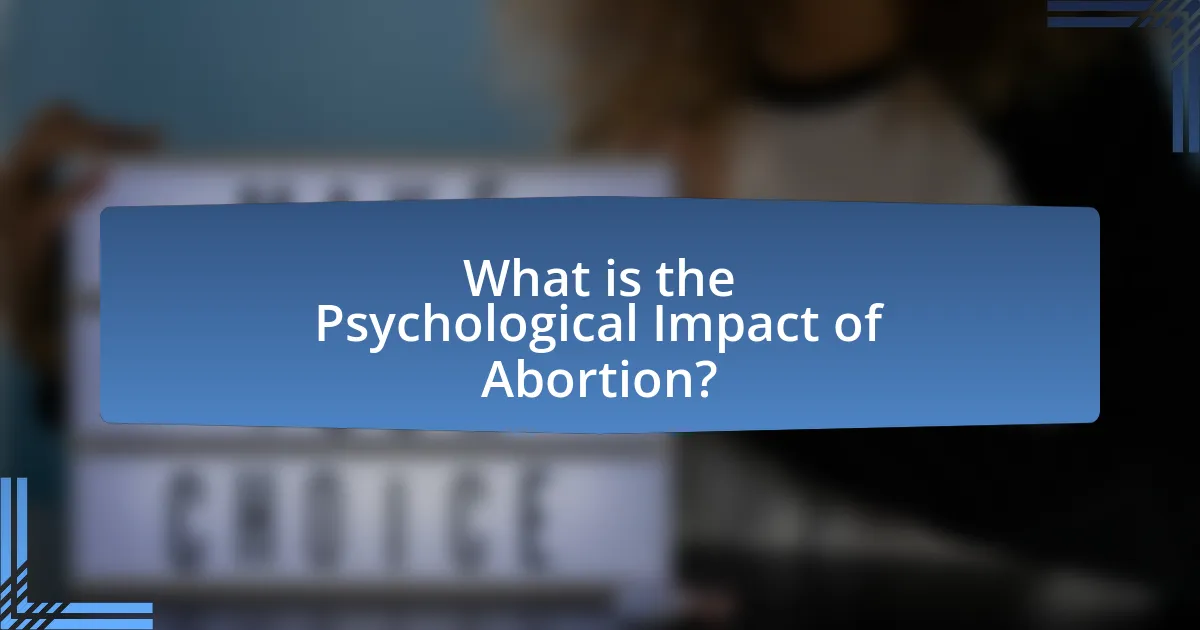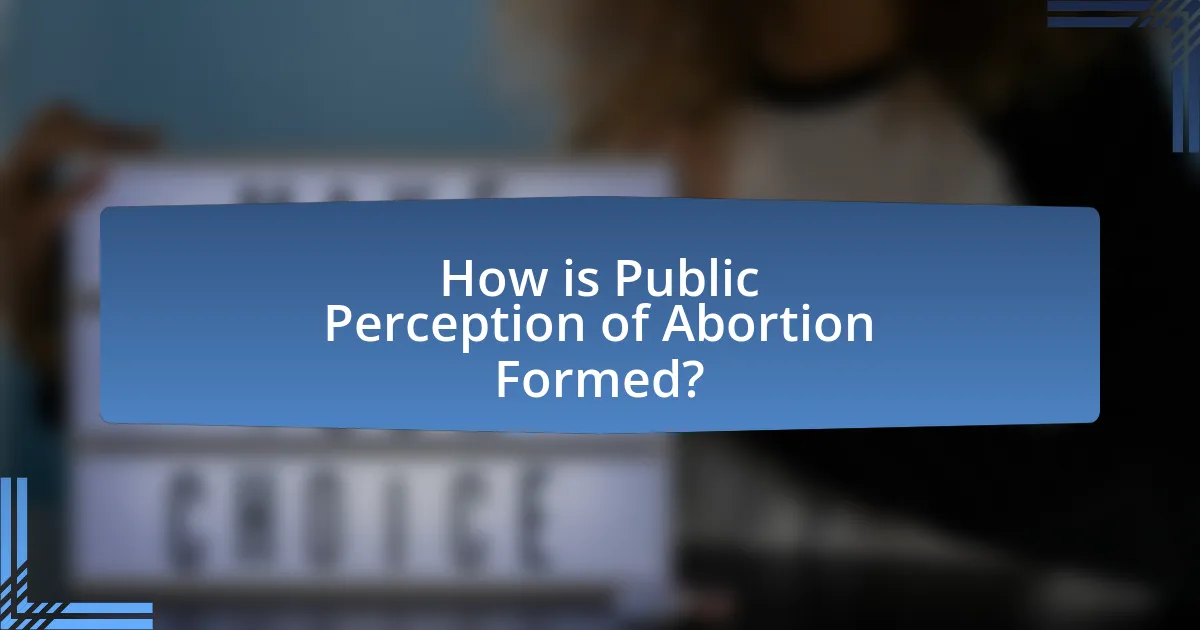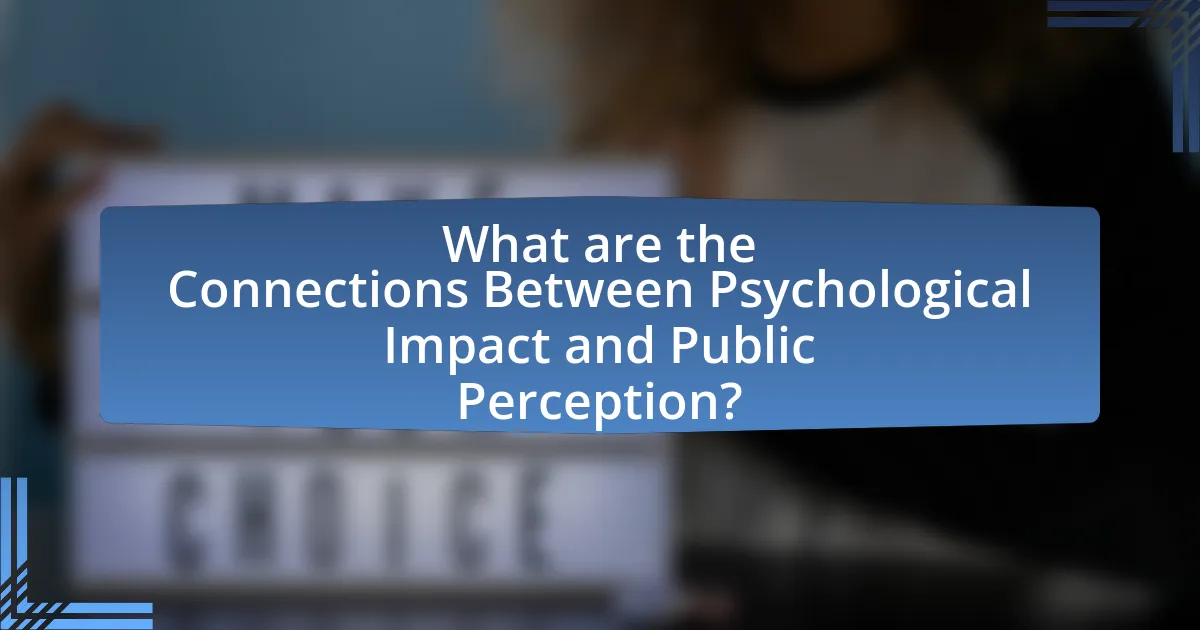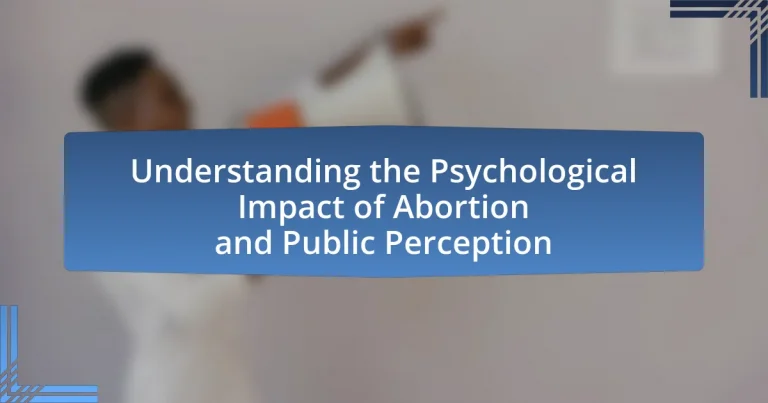The article examines the psychological impact of abortion and its relationship with public perception. It highlights that individuals may experience a range of emotional responses post-abortion, including relief, guilt, and anxiety, with research indicating that approximately 10% of women report significant psychological distress. Factors influencing these outcomes include personal beliefs, social support, and individual circumstances, while stigma can exacerbate negative mental health effects. The article also discusses how public attitudes towards abortion shape policy and access to services, emphasizing the importance of understanding these dynamics to improve care and support for individuals affected by abortion.

What is the Psychological Impact of Abortion?
The psychological impact of abortion can vary significantly among individuals, often resulting in a range of emotional responses including relief, guilt, sadness, and anxiety. Research indicates that while many individuals report feeling relief after an abortion, a notable percentage may experience negative emotions such as regret or depression. A study published in the journal “JAMA Psychiatry” found that approximately 10% of women reported experiencing significant psychological distress following an abortion, while the majority did not experience long-term negative mental health effects. This variability in psychological outcomes is influenced by factors such as personal beliefs, social support, and the circumstances surrounding the abortion.
How does abortion affect mental health?
Abortion can have varying effects on mental health, with some individuals experiencing negative psychological outcomes while others report relief and improved well-being. Research indicates that approximately 10% of women may experience significant mental health issues following an abortion, such as anxiety, depression, or feelings of guilt. A study published in the journal “JAMA Psychiatry” by Dr. Julia Steinberg and colleagues found that women who were denied an abortion were more likely to experience anxiety and lower life satisfaction compared to those who had access to the procedure. This suggests that the context of the abortion decision, including personal circumstances and support systems, plays a crucial role in determining mental health outcomes.
What are the common psychological responses following an abortion?
Common psychological responses following an abortion include feelings of relief, guilt, sadness, and anxiety. Research indicates that many individuals experience a complex mix of emotions, with studies showing that approximately 30% report feelings of guilt or regret, while others may feel a sense of liberation or empowerment. A study published in the journal “JAMA Psychiatry” by Coleman et al. (2011) found that the majority of women felt relief after an abortion, but a significant minority experienced negative emotions, highlighting the variability in psychological responses.
How do individual circumstances influence psychological outcomes?
Individual circumstances significantly influence psychological outcomes by shaping an individual’s emotional responses, coping mechanisms, and overall mental health. Factors such as socioeconomic status, personal history, cultural background, and support systems can determine how a person processes experiences, including those related to abortion. For instance, research indicates that women with strong social support networks report lower levels of anxiety and depression following abortion compared to those without such support (Kimport et al., 2016, “The Role of Social Support in Women’s Post-Abortion Experiences,” Women’s Health Issues). Additionally, individuals from marginalized communities may face unique stressors that exacerbate psychological distress, highlighting the importance of context in understanding mental health outcomes.
What factors contribute to the psychological impact of abortion?
The psychological impact of abortion is influenced by several factors, including individual beliefs, social support, and the circumstances surrounding the abortion. Individual beliefs, such as personal, cultural, or religious views on abortion, can significantly shape emotional responses, with those holding negative beliefs often experiencing higher levels of guilt and anxiety. Social support plays a crucial role; individuals with strong support systems tend to report better psychological outcomes compared to those who feel isolated or stigmatized. Additionally, the circumstances of the abortion, such as whether it was a wanted or unwanted pregnancy, can affect emotional well-being, with unwanted pregnancies often leading to more complex feelings post-abortion. Research indicates that these factors collectively contribute to the varied psychological experiences individuals face after an abortion, highlighting the importance of context in understanding its impact.
How do pre-existing mental health conditions play a role?
Pre-existing mental health conditions significantly influence the psychological impact of abortion on individuals. Research indicates that individuals with a history of mental health issues, such as anxiety or depression, may experience heightened emotional distress following an abortion compared to those without such conditions. A study published in the journal “Psychological Medicine” found that women with pre-existing mental health disorders reported more severe psychological outcomes post-abortion, including increased feelings of guilt and regret. This correlation underscores the importance of considering mental health history when assessing the potential psychological effects of abortion on individuals.
What is the significance of social support in recovery?
Social support is crucial in recovery as it enhances emotional well-being and facilitates coping mechanisms. Research indicates that individuals with strong social support networks experience lower levels of anxiety and depression during recovery processes. For instance, a study published in the Journal of Health Psychology found that social support significantly predicts recovery outcomes, with participants reporting improved mental health when they received emotional and practical assistance from friends and family. This underscores the importance of social connections in fostering resilience and promoting positive recovery experiences.
Why is it important to understand the psychological impact of abortion?
Understanding the psychological impact of abortion is crucial because it informs healthcare providers, policymakers, and society about the emotional and mental health consequences that individuals may experience post-abortion. Research indicates that a significant number of individuals report feelings of relief, but others may experience anxiety, depression, or regret, highlighting the need for tailored psychological support. For instance, a study published in the journal “JAMA Psychiatry” found that about 10% of women reported experiencing negative emotions after an abortion, emphasizing the importance of addressing these psychological effects to improve overall care and support systems.
How can awareness of psychological effects improve care for individuals?
Awareness of psychological effects can significantly improve care for individuals by enabling healthcare providers to tailor their support and interventions to meet emotional and mental health needs. For instance, understanding that individuals may experience anxiety, depression, or guilt following an abortion allows providers to offer appropriate counseling and resources, thereby enhancing overall well-being. Research indicates that targeted psychological support can reduce long-term mental health issues, as evidenced by a study published in the journal “Psychological Medicine,” which found that individuals receiving comprehensive emotional care post-abortion reported lower levels of distress compared to those who did not receive such support. This highlights the importance of integrating psychological awareness into care practices to foster better health outcomes.
What role does stigma play in the psychological impact of abortion?
Stigma significantly exacerbates the psychological impact of abortion by contributing to feelings of shame, guilt, and isolation among individuals who undergo the procedure. Research indicates that individuals facing stigma are more likely to experience negative mental health outcomes, such as anxiety and depression, due to societal judgment and lack of support. A study published in the journal “Social Science & Medicine” found that women who perceived higher levels of stigma related to abortion reported greater psychological distress and lower self-esteem. This correlation highlights how societal attitudes can influence personal experiences, leading to a compounded psychological burden for those affected by abortion.

How is Public Perception of Abortion Formed?
Public perception of abortion is formed through a combination of cultural, social, political, and personal factors. Cultural narratives, influenced by religious beliefs and societal norms, shape individual attitudes toward abortion. Social interactions, including discussions with family, friends, and peers, further reinforce or challenge these beliefs. Political discourse, particularly from influential leaders and media, plays a significant role in framing abortion as a moral or legal issue, impacting public opinion. Research indicates that exposure to diverse viewpoints and personal experiences, such as those shared by individuals who have undergone the procedure, can also significantly alter perceptions. For instance, studies show that personal stories can humanize the issue and foster empathy, leading to more nuanced views on abortion.
What influences public attitudes towards abortion?
Public attitudes towards abortion are influenced by a combination of cultural, religious, political, and social factors. Cultural norms shape individual beliefs about morality and ethics surrounding abortion, while religious teachings often dictate views on the sanctity of life, impacting followers’ opinions. Political ideologies also play a significant role, as individuals align their views with party platforms that either support or oppose abortion rights. Additionally, social factors such as education level, socioeconomic status, and personal experiences with reproductive health can further shape attitudes. Research indicates that in the United States, for example, a 2021 Pew Research Center study found that 61% of adults believe abortion should be legal in all or most cases, reflecting a shift in public opinion influenced by these various factors.
How do cultural and religious beliefs shape perceptions?
Cultural and religious beliefs significantly shape perceptions by influencing individual values, attitudes, and behaviors. These beliefs provide frameworks through which people interpret experiences and make decisions, particularly regarding sensitive issues like abortion. For instance, research indicates that individuals from cultures with strong religious affiliations often view abortion as morally unacceptable, which directly affects their stance on the issue and their support for related policies. A study published in the Journal of Religion and Health found that religious beliefs correlate with lower acceptance of abortion, highlighting how these beliefs can lead to polarized views within society. Thus, cultural and religious contexts serve as critical lenses through which people perceive and respond to complex social issues.
What role does media representation play in public opinion?
Media representation significantly shapes public opinion by influencing perceptions, attitudes, and beliefs about various issues, including abortion. Research indicates that the portrayal of abortion in media can either normalize or stigmatize the procedure, affecting how individuals view it within societal contexts. For instance, a study published in the journal “Health Communication” found that positive media representation of abortion can lead to increased support for reproductive rights, while negative portrayals can reinforce stigma and opposition. This demonstrates that the way media frames abortion directly impacts public discourse and individual attitudes, highlighting the critical role of representation in shaping societal views.
Why do public perceptions of abortion matter?
Public perceptions of abortion matter because they significantly influence policy decisions, societal norms, and individual experiences related to reproductive health. Research indicates that when public opinion leans towards restrictive views on abortion, it often leads to the enactment of laws that limit access to abortion services, as seen in various U.S. states where legislation reflects prevailing negative attitudes. Furthermore, societal stigma surrounding abortion can affect the mental health of individuals who seek these services, as negative perceptions may lead to feelings of shame or isolation. Studies, such as those published in the Journal of Health and Social Behavior, demonstrate that supportive public attitudes can foster an environment where individuals feel more empowered to make informed choices about their reproductive health. Thus, understanding public perceptions is crucial for addressing the psychological impact of abortion on individuals and shaping a more supportive societal framework.
How can public opinion affect policy and access to abortion services?
Public opinion significantly influences policy and access to abortion services by shaping legislative agendas and funding decisions. When a majority of the population supports or opposes abortion rights, policymakers often respond to these sentiments to secure votes and maintain public approval. For instance, in the United States, surveys indicate that approximately 60% of Americans support the right to abortion, which has led to the introduction of more protective legislation in various states. Conversely, in regions where public opinion is predominantly anti-abortion, such as certain conservative states, restrictive laws have been enacted, limiting access to services. This dynamic illustrates how public sentiment directly impacts the legal landscape surrounding abortion, affecting both availability and the rights of individuals seeking these services.
What impact does public perception have on individuals seeking abortions?
Public perception significantly influences individuals seeking abortions by shaping their feelings of stigma, support, and decision-making. Negative societal attitudes can lead to increased anxiety and isolation for those considering abortion, as they may fear judgment or backlash from their community. Research indicates that individuals in environments with supportive views on abortion report higher levels of emotional well-being and are more likely to seek necessary care without delay. Conversely, in areas where abortion is heavily stigmatized, individuals may experience heightened stress and reluctance to access services, which can adversely affect their mental health and overall decision-making process.

What are the Connections Between Psychological Impact and Public Perception?
The connection between psychological impact and public perception is significant, as individual psychological experiences shape collective societal views. For instance, research indicates that personal experiences with abortion can lead to varied emotional responses, influencing how individuals perceive the issue publicly. A study by the Guttmacher Institute found that women who have undergone abortions often report feelings of relief and empowerment, which can contrast with the stigma surrounding abortion in public discourse. This discrepancy highlights how psychological impacts can inform and alter public perceptions, leading to a more nuanced understanding of abortion beyond societal stereotypes.
How do societal attitudes influence individual psychological experiences?
Societal attitudes significantly shape individual psychological experiences by influencing perceptions, emotions, and behaviors related to various issues, including abortion. For instance, research indicates that individuals in communities with supportive attitudes towards abortion are more likely to experience positive psychological outcomes, such as lower levels of anxiety and depression, compared to those in communities with stigmatizing views. A study published in the journal “Social Science & Medicine” by Foster et al. (2018) found that women who felt supported by their social networks during and after the abortion process reported better mental health outcomes. This demonstrates that societal attitudes not only affect individual feelings of acceptance or shame but also impact overall mental well-being and coping mechanisms.
What is the relationship between stigma and mental health outcomes?
Stigma negatively impacts mental health outcomes by exacerbating feelings of shame, isolation, and distress among individuals with mental health conditions. Research indicates that individuals facing stigma are less likely to seek help, which can lead to worsening symptoms and increased risk of mental health disorders. A study published in the journal “Psychological Medicine” found that perceived stigma is associated with higher levels of depression and anxiety, highlighting the detrimental effects of societal attitudes on mental well-being.
How can public discourse shape the psychological support available?
Public discourse can significantly shape the psychological support available by influencing societal attitudes and policies regarding mental health and abortion. When public conversations normalize discussions around mental health and the psychological effects of abortion, they can lead to increased funding for mental health services and the development of supportive resources. For instance, research published in the Journal of Health Politics, Policy and Law indicates that public advocacy can result in legislative changes that enhance access to psychological support for individuals affected by abortion. This demonstrates that a positive public discourse can create an environment where psychological support is prioritized and made more accessible.
What can be done to improve understanding and support for those affected by abortion?
To improve understanding and support for those affected by abortion, comprehensive education and awareness campaigns should be implemented. These initiatives can provide accurate information about the psychological impacts of abortion, addressing common misconceptions and stigma. Research indicates that individuals who receive supportive counseling and education report better emotional outcomes post-abortion (González et al., 2020, Journal of Health Psychology). Additionally, creating safe spaces for open dialogue, where individuals can share their experiences without judgment, fosters community support and understanding.
What strategies can help reduce stigma and promote mental health awareness?
To reduce stigma and promote mental health awareness, implementing educational programs that provide accurate information about mental health conditions is essential. These programs can dispel myths and misconceptions, fostering a more informed public. Research indicates that stigma can be significantly reduced through contact-based education, where individuals with lived experiences share their stories, leading to increased empathy and understanding. For instance, a study published in the journal “Psychological Medicine” found that personal narratives can effectively challenge stereotypes and promote acceptance. Additionally, campaigns that normalize mental health discussions, such as Mental Health Awareness Month, have proven successful in raising awareness and encouraging open conversations, further contributing to stigma reduction.
How can healthcare providers better address the psychological needs of individuals post-abortion?
Healthcare providers can better address the psychological needs of individuals post-abortion by implementing comprehensive mental health support services tailored to their specific experiences. Research indicates that approximately 10-20% of individuals may experience significant emotional distress following an abortion, highlighting the necessity for targeted psychological care. Providers should offer access to counseling, support groups, and educational resources that normalize the range of emotions experienced, such as grief, guilt, or relief. Additionally, integrating mental health screenings into post-abortion follow-up appointments can help identify those in need of further support, ensuring timely intervention. Evidence from studies, such as one published in the Journal of the American Medical Association, shows that individuals who receive psychological support post-abortion report improved emotional well-being and reduced anxiety levels.


